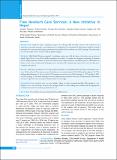Please use this identifier to cite or link to this item:
https://hdl.handle.net/20.500.14356/1576Full metadata record
| DC Field | Value | Language |
|---|---|---|
| dc.contributor.author | Shrestha, Gambhir | - |
| dc.contributor.author | Paudel, Prajwal | - |
| dc.contributor.author | Shrestha, Parashu Ram | - |
| dc.contributor.author | Jnawali, Shambhu Prasad | - |
| dc.contributor.author | Jha, Deepak | - |
| dc.contributor.author | Ojha, Tek Raj | - |
| dc.contributor.author | Lamichhane, Bikash | - |
| dc.date.accessioned | 2023-05-16T06:38:48Z | - |
| dc.date.available | 2023-05-16T06:38:48Z | - |
| dc.date.issued | 2018 | - |
| dc.identifier.citation | ShresthaG., PaudelP., ShresthaP. R., JnawaliS. P., JhaD., OjhaT. R., & LamichhaneB. (2018). Free Newborn Care Services: A New Initiative in Nepal. Journal of Nepal Health Research Council, 16(3), 340-344. https://doi.org/10.33314/jnhrc.v16i3.1526 | en_US |
| dc.identifier.issn | Print ISSN: 1727-5482; Online ISSN: 1999-6217 | - |
| dc.identifier.uri | http://103.69.126.140:8080/handle/20.500.14356/1576 | - |
| dc.description | Original Article | en_US |
| dc.description.abstract | Abstract Background: Nepal has made a significant progress in reducing child mortality. However, the annual rate of reduction in neonatal mortality is not satisfactory. As safeguarded by constitution of Nepal and to address neonatal mortality due to poverty and inequity, government has introduced free newborn care (FNC) package. This study aims to assess the status of FNC services in all the public hospitals. Methods: Child Health Division organized 5 workshops region-wise with the theme of newborn care services in March/April 2018 to cover all the public hospitals in the country. A template was designed comprising of duration of FNC implementation, number of newborns admitted since implementation, morbidities pattern, and number of babies served. It was circulated and all hospitals were advised to fill it and present in the review. Later, the data were compiled and analyzed. Results: Only 58 presentations out of 93 participated hospitals were included in this study. The total admitted cases were 8564 newborns. The common causes of admission were neonatal sepsis (44.5%) followed by asphyxia (14.29%) and hyperbilirubinemia (11.4%). A total of 1573 neonates received services of FNC package C, 3722 package B, 3081 received package A. The main challenges faced in implementation reported were lack of infrastructure and human resources to provide services and the reimbursement is not enough. Conclusions: Free newborn care is a new initiative taken to reduce neonatal mortality. This package is very helpful to serve sick newborns. However, the package should be revised taking into consideration the appropriate reimbursement and extra staffs to provide this service. Keywords: Free newborn care; government efforts; health services. | en_US |
| dc.language.iso | en | en_US |
| dc.publisher | Nepal Health Research Council | en_US |
| dc.relation.ispartofseries | Jul-Sep 2018;1526 | - |
| dc.subject | Free newborn care | en_US |
| dc.subject | Government efforts | en_US |
| dc.subject | Health services | en_US |
| dc.title | Free Newborn Care Services: A New Initiative in Nepal | en_US |
| dc.type | Journal Article | en_US |
| local.journal.category | Original Article | - |
| Appears in Collections: | Vol. 16 No. 3 Issue 40 Jul - Sep 2018 | |
Files in This Item:
| File | Description | Size | Format | |
|---|---|---|---|---|
| 1526-Manuscript-6679-1-10-20181030.pdf | Fulltext Article. | 191.21 kB | Adobe PDF |  View/Open |
Items in DSpace are protected by copyright, with all rights reserved, unless otherwise indicated.
